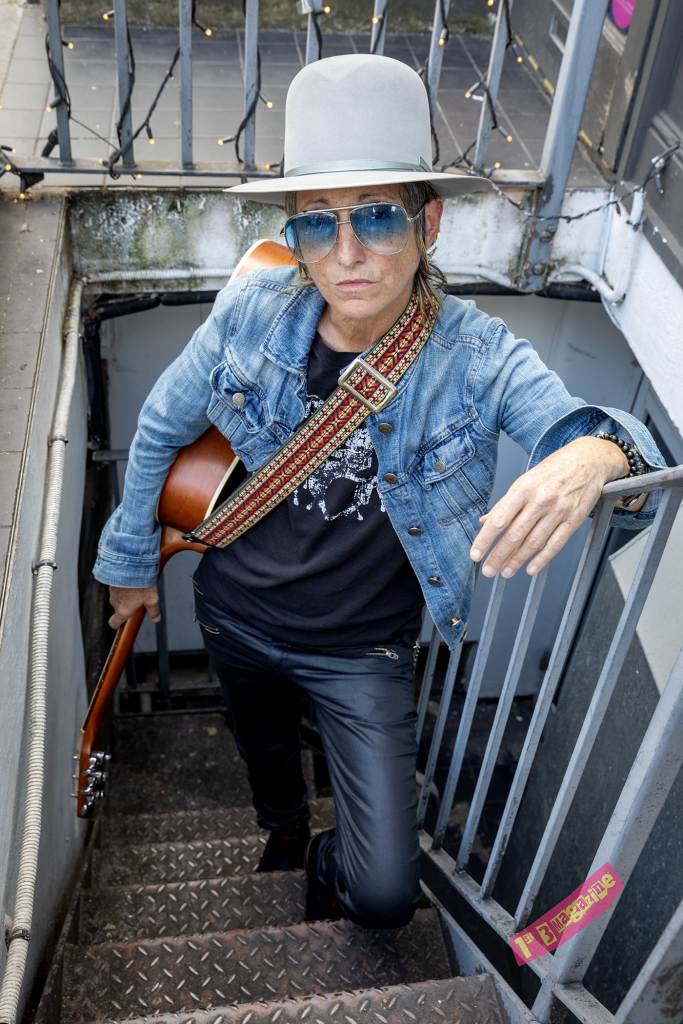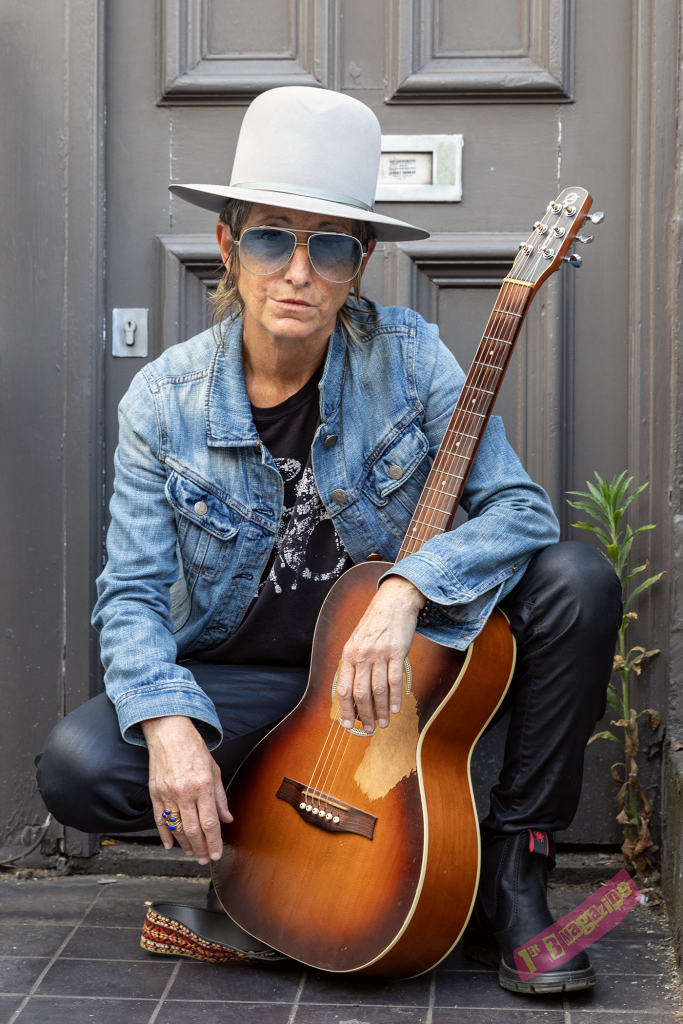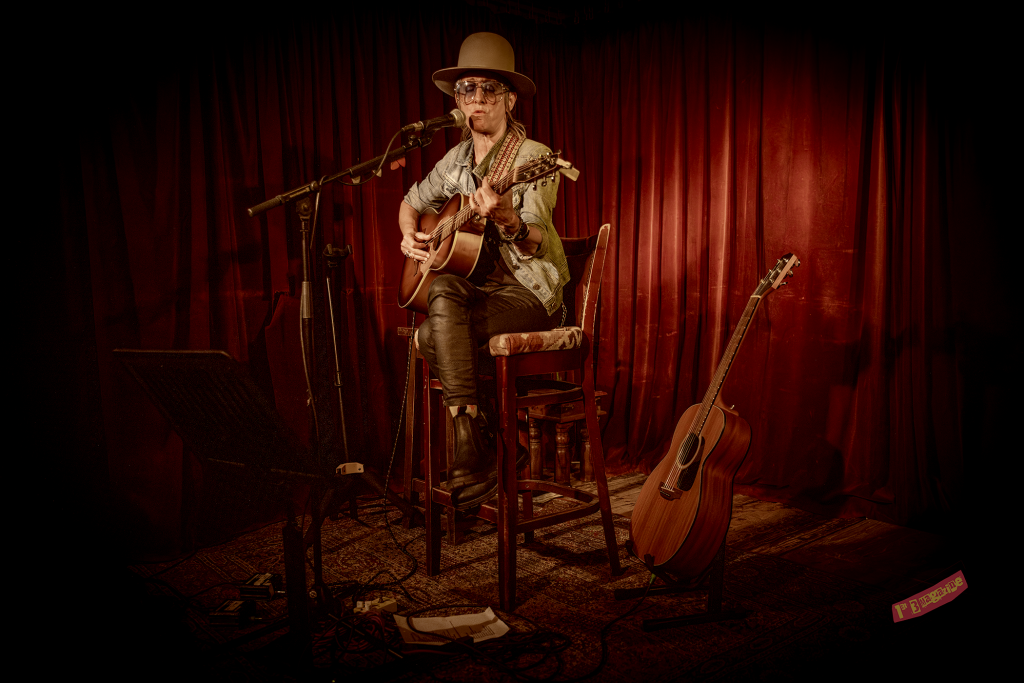In the intimate setting of Green Note Camden, Emily Duff sits down with 1st 3 Magazine for a candid conversation following her final UK gig of the tour.
Known for her genre-defying music and raw storytelling, Emily reflects on her diverse musical influences, her unconventional journey, and the profound impact of her personal experiences on her artistry.
From her formative years surrounded by the eclectic records of her parents to her unexpected career as a chef and eventual return to music, Emily’s story is one of resilience, creativity, and relentless passion. She opens up about the significance of her roles as a mother and a musician, the challenges she overcame from a tumultuous childhood, and her continuous drive to connect through her music.
With a deep love for her craft and an unwavering dedication to authenticity, Emily Duff’s narrative is as compelling and multifaceted as her music. Join us as she shares her insights on life, love, and the beautiful chaos of her artistic journey.
I started playing guitar when I was seven."
Emily Duff
1st 3 Magazine: This is the last of your UK gigs on this year’s tour—what have been the highlights?
Emily Duff: Every show is a highlight for me! Because it’s a privilege to play here—this is where I’ve found people love music and the kind of music I do because they’re kind of lyrical, and they’re stories and people love to connect through them and listen. I really like playing in Pontefract, West Yorkshire, at The Robin Hood. They have this thing called the ‘Sunday Showdown’ and it was special because I got to play on my birthday!
1st 3: The Yorkshire people are very honest!
E: It was two shows, and they both sold out. I sold all my vinyl and almost all my merch! It’s all been special, but that one stood out because the audience was so appreciative—and it was my birthday.
1st 3: It has been said that you are a ‘genre bender’—you don’t stick to one style.
E: Yes, I say that I have musical genre-dysphoria!
1st 3: So going back to your earliest memories (and I know that you had a lot of trauma when you were little), how was your musical style shaped? What was in your parents’ record collection?
E: Oh well, that’s the thing; they did have great records in the house. While they weren’t good parents, they were good musical teachers. Kris Kristofferson, Johnny Cash, Frank Sinatra, Janis Joplin, Brill Building writers—Neil Diamond, Ellie Greenwich, Carole King… so great songwriters. My favorite band growing up was Blood, Sweat & Tears. I liked The Yardbirds, Led Zeppelin, and I loved pop. I watched The Partridge Family and The Monkees, so that stuff was really important to me too.
1st 3: Your mum played guitar?
E: She was a folk guitarist. She had a 1967 Giannini guitar which she still has, and she taught me four chords: G, Am, Em, and D7. You can play almost every song from the 1950s if you know those! That was her era. I started playing guitar when I was seven.
1st 3: You went on to play ‘cello?
E: Yes, I was a classical cellist for a really long time, which is how I got into writing country music with string arrangements. I was writing baroque-style string quartet arrangements of songs.
I woke up one morning and saw that I was smoking the same cigarettes and drinking the same scotch as my mother, and I said stop. That’s it."
Emily Duff

1st 3: Have you always been a composer? When did you start writing music?
E: I was playing Haydn, Bach, Romberg, and then I started writing sonatas for ‘cello and—450 Camaro engine! So right away I thought, “Oh that’s a noise!” and started designing, making, and building instruments. I went to college (SUNY Purchase) where there was a dance program and a music program. I wasn’t in either of those, but I got together with musicians, dancers, sculptors, and choreographers, so I wound up doing a lot of performance art on instruments that I designed and built.
1st 3: String?
E: Mostly, yes, but string instruments that were combined with percussion.
1st 3: Chromatic or diatonic?
E: Chromatic. They were all based on what I knew, but I took it to a different place.
1st 3: How did your career develop from then on? What did you want to do? Did you want to be a performer?
E: I was supposed to graduate (and I did graduate!) from school and go to downstate medical to be a nurse midwife. But I got thwarted again! I was living in Tribeca (in the ‘80s); I wound up in a kitchen, started apprenticing, and then I became a chef for 25 years! I was cooking, I started my own restaurant, and in 1995 I also sold a script to Disney, Touchstone. It’s been like this, my life; music, teaching, cooking—I’ve wanted to do it all.
1st 3: Do you think your childhood struggles made you more of a go-getter? More determined to succeed? You created a great big life for yourself…
E: Yes! My sister used to say we were raised by a pack of wolves, but I always say I was raised by a pack of cigarettes. I started smoking when I was ten years old—I was pinching my grandmother’s cigarettes. Because I had no boundaries—I had no boundaries. And that was really good and really bad. Because I started so young I stopped everything when I was 24. I got sober at 24. I woke up one morning and saw that I was smoking the same cigarettes and drinking the same scotch as my mother, and I said stop. That’s it.
1st 3: Has it been really important to you to be a good mum?
E: Well, I never thought I’d have children, get married… but then I met the person who made me want them. I mean, I got it. I never understood before, why people wanted children until I met my husband.
I don’t call it songwriting, I call it song catching."
Emily Duff

1st 3: Tell me a little more about your role as a mum, following your atypical start to life.
E: It’s really important to me. I didn’t realize how important it was to me until I had my daughter Sylvia. She was named after my grandmother because after my mum left, my grandmother moved in, and she was the only person who ever made me feel safe. And I loved her. When Sylvia was born and I looked at her for the first time, my first thought was “Oh hello again!” That this was something I was supposed to do.
1st 3: Like songwriting—it comes easily to you. We’ve read that sometimes you can write a song a day.
E: I do! I have to stop myself from writing!
1st 3: Have you always been like that?
E: I’m a double Gemini—I don’t call it songwriting, I call it song catching. Most people are so caught up in being the God of it that they don’t sit back and let the song happen. I feel more like I have antennae, rather than being a pilot. It’s like when I was back being a chef—people would ask me, what’s the difference between being a male and a female chef? And I would say, a female chef feeds her customers and a male chef feeds his ego! I don’t feel the need to lay down on top of an ingredient and fuck it into submission. Similarly, I follow the song. It will come to me if I let it stay open. I respect it—I don’t need to be the God of it.
1st 3: So when they come to you, the songs, how do you record them?
E: They’re all different. Sometimes I can be walking down the street and I just start singing. Like with “Jesus, Love This Tired Woman”; I had just dropped my son off at school and I hadn’t been sleeping; I was exhausted. As soon as I walked out of school, I literally started singing it like I knew it already. By the time I got home it was almost like a hymn, a mantra; and as I got inside I just had to grab my guitar and write it down. It’s a gift, you know, when that happens. And I don’t mean I’m gifted; I just mean I’ve been given a gift. It’s lovely.
1st 3: Do you still play the ‘cello?
E: I don’t, because I live in a tiny apartment in Greenwich—340 square feet! All four of us, no upstairs, a hound dog, thirty guitars—and Sylvia’s boyfriend often stays over! I moved in 34 years ago, just me, my pug, and the guitars. At that point, I was never getting married or having kids. There’s an energy there in my house.
1st 3: And has your music, your voice, changed over the years? Did it change after you became a mother?
E: Yes it’s changed, but I’ve never liked my voice. I’ve always called myself a songwriter, never a singer. I think I’ve got an interesting voice and maybe it’s getting a bit more gravelly and resonant—but I’ve done 11 gigs in a row and I might be missing a few top notes!
I love creative people and every time I find something new it’s like a treasure."
Emily Duff

1st 3: What do you write about? Do your songs reflect your life stages?
E: I write about everything! Everything comes from a different place. You don’t think that the human heart could get any bigger, that you’d have the capacity to love or feel any more because it’s a physiological thing and your heart is just this big—but then you have children and you just burn brighter. Your desire to be present grows. For example—I wrote “Hallelujah Hello” which is a gospel song. I was born Jewish. But my daughter is seven years old and she’s sitting in this little portable dog washing bowl that sits in the shower, and I’m cleaning up after dinner, and she starts “Bringing in the Sheaves” and I say, “Sylvia, how do you know that song?” She says, “Little House on the Prairie—and why don’t we go to church?” I explain that we’re Jewish and she says, “No, you’re Jewish but Daddy’s not and I want to go to church.” And that started a period when Sylvia became really connected with our Episcopalian neighborhood church. So then I started going, and I fell in love with it—and then I became a member of the church, and became what I call a ‘Jew-discopalian’!
1st 3: A bit like your songwriting! That’s you—a lovely rich mixture. Whose music are you excited about at the moment?
E: Everybody’s music! I love creative people and every time I find something new it’s like a treasure. There are three girls in a band in NYC, they’re young, I’ve known them since they were 14/15 and they’re killing it! They’re called Hello Mary. I had them over to my house a while ago and added acoustic instruments to their sound. They are a rock band, touring all over the world now with a manager and a label! I’m specifically excited about every single young woman who picks up a guitar, and who wants to write about her experiences. I will help anyone. I will give her a guitar and extend every courtesy.
We all make our own happiness."
Emily Duff
1st 3: Where has it come from, all of that love? Do you think you were born with it? Do you think your Grandmother gave it to you?
E: No, I had to make it on my own. I think I just became really used to producing on demand.
1st 3: And knowing that you had to make your own happiness?
E: We all make our own happiness.
1st 3: Maybe not a lot of people realize that. And sometimes people that had a tougher start find it harder. But not you.
E: No!
1st 3: You’ve got it all—the cute kids, the cute husband, the West Village apartment… have you got any life goals left?
E: I’m just going to see where I go… I would like to get back into riding horses! I miss horses. And my mum… she’s had some health problems, so I’m going to go to help her. You only have one mum. She might not have been able to be a mum to me when I needed her, but that was because of other things.
1st 3: It seems you have a huge capacity to love and forgive, and to infuse others with joy.
E: We all have. It’s inside every one of us.
Emily Duff played Green Note Camden on June 23rd, 2024

